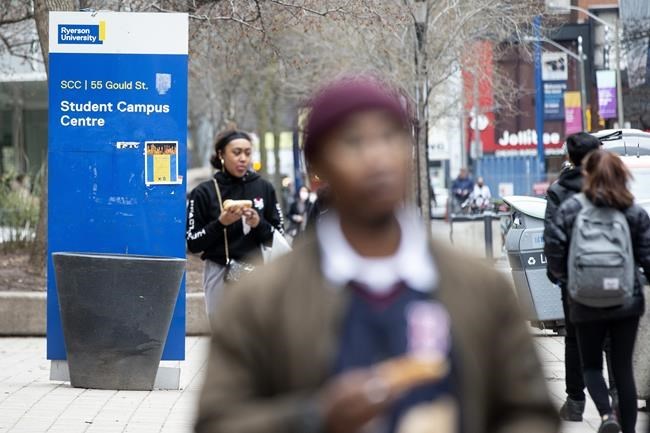TORONTO ŌĆö A year after Ryerson University was reintroduced to the public with a new name ŌĆō a major move in addressing problematic colonial legacies ŌĆō its president says the school's updated identity has helped bring a previously divided campus community together.┬Ā
But some Indigenous faculty say they're worried progress on reconciliation has slowed considerably since Toronto Metropolitan University took on its new name.┬Ā
University president Mohamed Lachemi said renaming the school has been an important part of its commitment to reconciliation.┬Ā
"The new name proved to be a source of unity," he said in an interview. "A couple of years ago, the old name was a source of division and frustration, and I'm not feeling that anymore."
The university had faced calls for years to change its name and cut ties with its former namesake, Egerton Ryerson, considered an architect of Canada's residential school system.┬Ā
Those demands ramped up in 2021 following the discovery of what are believed to be the remains of Indigenous children in unmarked graves on the grounds of former residential schools.
Indigenous professors asked the school in the summer of 2021 to change the university name and remove a statue of Ryerson from campus. Indigenous students penned an open letter calling on peers, faculty and alumni to stop using the name in email signatures, correspondence and on resumes, urging the use of "X University" instead.
The campus statue of Ryerson was torn down by protesters that summer and the university opted not to replace it.
Months later, just before the fall semester began, a special task force employed to address the legacy of Ryerson released 22 recommendations ŌĆō all accepted by the university's board of governors ŌĆō including a recommendation to change the school's name.┬Ā
A committee was then tasked with conducting consultations and coming up with a shortlist of possible new names. The university board approved a finalist in spring 2022, ushering in a reintroduction of the school to the public as Toronto Metropolitan University.┬Ā
The change has been implemented in phases ŌĆō websites, social media handles and email addresses were altered to start, and the upcoming convocation in June will be the first to see students receive degrees with the new name. There were approximately 20,000 exterior and interior building signs that needed to be replaced, a process Lachemi said is mostly complete.
A year on, Lachemi said the new name is not about erasing the university's history but marks the beginning of a new chapter.┬Ā
"The lesson for all our community was really the importance of community engagement, discussion and dialogue," he said.┬Ā
"A lot of people are afraid of that type of dialogue. But I would say the best way to deal with the challenges is making sure you get feedback and input from all community members."
But Hayden King, executive director of TMU-based Indigenous thinktank the Yellowhead Institute, said there have been few other meaningful efforts at reconciliation since the name change.┬Ā
"We lobbied, we fought for years to have that name changed and to have that statue removed. It was a hard fight and I think the Indigenous community deserves a lot of credit for that ... we all take a lot of pride in that," said King.
"Unfortunately, the progress has stalled after that. It's almost as though the university gave us the name change and now, the era of reconciliation at the university is over."
University spokeswoman Tania Ulrich said TMU remains committed to implementing all of the task force's recommendations, and it has already completed many including adding a new Black Studies minor and new funding to increase access to higher education for Indigenous students.┬Ā
Other recommendations, like one to educate community members on Ryerson's history through physical and digital installations, are being worked on.
King, of the Yellowhead Institute, said there has been some movement on hiring more Indigenous professors, but no curricular changes. TMU is one of the few universities in Canada without an Indigenous studies program, he said, which makes it harder to recruit Indigenous students.
"When it comes to the foundational things that Indigenous students, staff and faculty need to thrive and grow and transform the place, that's all quite limited in the year since the name change," King said.
Lynn Lavall├®e, strategic lead of Indigenous resurgence at TMU's community services department, said she thinks the school has focused too much on technical changes and urged it to move ahead on deeper reconciliation efforts.┬Ā
The university could benefit from improving resources to support students experiencing anti-Indigenous racism, for example, she said. ┬Ā
"When it comes to a name change, don't just let it be another token thing, like a land acknowledgement," she said. "If Indigenous people are still being harmed within the institution, then the land acknowledgements or the name change don't matter."
This report by The 91įŁ┤┤ Press was first published April 26, 2023.
Tyler Griffin, The 91įŁ┤┤ Press



